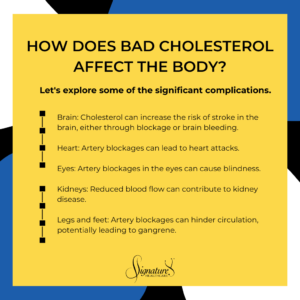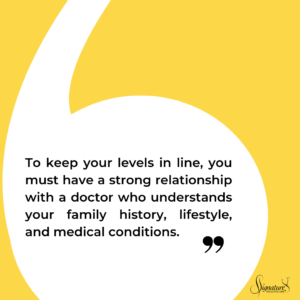Can High Cholesterol Cause Headaches?
People with high levels of cholesterol often have very few symptoms — until they experience angina or a full-on heart attack.
Interestingly, however, some high-cholesterol patients report frequent headaches. Is there a link? Can high cholesterol cause headaches?
What Is Cholesterol?
Cholesterol is a fatty, wax-like substance manufactured by the liver. It supports the body in various metabolic processes, including developing cell walls, vital hormones, and absorption of vitamin D from the sun. Your liver typically makes all the cholesterol your body needs.
But cholesterol also enters the body through certain foods you eat, like red meats, butter, and full-fat dairy products.
We often hear the terms “good cholesterol” and “bad cholesterol.” Bad cholesterol refers to an elevated level of low-density lipoproteins (LDLs). Some LDLs are more problematic than others. Floating in the circulatory system, they stick to the arterial lining and cause artery-clogging inflammation.
High-density lipoproteins, or HDLs, usually serve a more helpful purpose: They scavenge cholesterol particles from the bloodstream and return them to the liver. By removing cholesterol from the circulatory system, they decrease the risk of inflammation and blocked arteries.
Unfortunately, high levels of LDL rarely cause symptoms, so many people with dangerously high “bad cholesterol” don’t know they have it. This is a good reason to see your concierge doctor regularly for bloodwork and follow their advice on screening and treatment.

How Does Bad Cholesterol Affect the Body?
The bad effects of LDLs can manifest throughout the body. Let’s consider some of the most serious complications:
- Brain: Within the brain, cholesterol can predispose a patient to stroke by causing blockages in the arteries or increasing the risk of bleeding in the brain.
- Heart: Clogged arteries can result in a heart attack.
- Eyes: Blocked arteries in the eyes may lead to blindness.
- Kidneys: Restricted circulation can cause kidney disease.
- Legs and feet: Clogged arteries often impair circulation and encourage gangrene to develop.
But Can High Cholesterol Cause Headaches?
In the absence of other symptoms, is a headache a possible early warning about high “bad cholesterol”?
The short answer: There’s no direct link between cholesterol and headaches.
However, some behaviors that lead to high cholesterol — smoking, consumption of red meats and fatty foods, inactivity, and obesity — can cause headaches. And an extremely severe headache may warn of a medical event, such as an impending stroke.
How to Lower Bad Cholesterol
Natural Approaches
If your “bad cholesterol” trends upward, your concierge doctor can work with you to evaluate your health and lifestyle and recommend helpful changes like these:
- Lose weight: Even five to 10% weight loss can have a very positive effect on high cholesterol levels.
- Get proper exercise: Even if your weight is healthy, follow a routine to stay physically active.
- Eliminate saturated fat: We used to blame high-cholesterol foods for increasing cholesterol in the body, but studies tell us the culprit is the saturated fat in beef, dairy (especially butter and cheese), and foods fried in high-“sat-fat” oils, like french fries. If you’re hungry, stay out of the drive-thru!
- Stop smoking. Quitting improves your HDLs (the scavengers that clean up excessive cholesterol), helping keep your arteries safe.
- Cut back on alcohol: Your liver breaks down alcohol and reconstructs it as cholesterol. So moderate consumption is key. (And that headache you’re experiencing might not be because of bad cholesterol but because of dehydration or a hangover.)
Prescription Medication
For patients with dangerously high (LDL) cholesterol, the most immediate and practical way to lower it is through prescribed medication, typically statins. Statins are a class of drugs that reduce the amount of cholesterol that the liver manufactures.
Since the first statin was approved nearly 40 years ago, clinical trials on millions of patients have found these medications safe and effective in reducing LDL cholesterol (and its complications such as heart attacks and strokes) by as much as 50–60%.
Your concierge physician works with you to carefully determine which of the available statins is best for you.
When Is It Time to Start Monitoring Your Cholesterol?
Monitoring cholesterol is critical, particularly since high levels show no symptoms:
- Between ages 9 and 11: Because of hormonal changes during these years, pediatric guidelines advise that young people have a single baseline cholesterol check.
- Between ages 17 and 21: Again, post-puberty, a single check is advised because of hormonal shifts.
- Adults over 21: Patients are advised to get their cholesterol checked at least once during their 20s. Thereafter, the CDC recommends that adults be screened every four to six years unless particular health conditions call for more frequent monitoring.
How often you have your cholesterol checked in adulthood depends on several factors, from gender and age to your medical profile.
Patients with a family history of high cholesterol and “early” heart disease (that is, occurring in a male under 50 or a woman under 55) should begin regular cholesterol screenings in their 20s or as a teen or preteen if there are unusual hereditary factors.
Managing Cholesterol Levels
Still wondering, “Can high cholesterol cause headaches?” Sticking within medically recommended cholesterol levels will go a long way toward maintaining a healthy metabolism, and that’s what’s essential.
To keep your levels in line, you must have a strong relationship with a doctor who understands your family history, lifestyle, and medical conditions.
Concierge care is uniquely positioned to provide you with the attention you deserve, as well as any treatment you may need to keep your cholesterol levels safe and healthy. Contact your Signature Healthcare physician for a regular screening.


Dr. Elizabeth Perry
Dr. Perry is board-certified in internal medicine, holding a medical degree from the Medical College of Virginia. She completed residencies in internal medicine at the University of Pennsylvania Hospital and in emergency medicine at Johns Hopkins Hospital. Dr. Perry served as the chairperson of the Health Services Committee for the Charlotte Chamber of Commerce in 2006-07 and received the Charlotte Business Journal’s “Women in Business Achievement Award” in 2006. She, her husband Jon, and their three children enjoy outdoor activities and travel.

